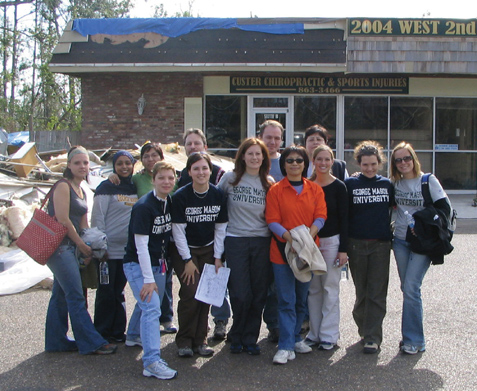
Counseling and development students went to the Gulf Coast with advisors Fred Bemak and Rita Chung to help residents cope with stress after Hurricane Katrina. "The learning scale was 180 degrees, straight up,” says Bemak.
By Amy Biderman,
When Hurricane Katrina hit the Gulf Coast last year, millions of dollars poured in to help with the physical needs of those affected – clothing, shelter and transportation. However, the need for emotional support was just as desperate – and students from Mason’s College of Education and Human Development (CEHD) faced that challenge head-on and got hands-on experience in the process.
“The mental health needs in the Gulf are overwhelming and are not being met,” says Fred Bemak, professor of counseling and development, who led a team of students recently to assist the victims of Hurricane Katrina with counseling and support.
The project, Counselors without Borders, is the first program of its kind at a U.S. university. Fourteen students from CEHD underwent intensive training on the skills needed for disaster counseling before making their initial trip to the Gulf Coast last November.
Once in Mississippi, they received logistical support and collaborated with the Federal Emergency Management Agency, the U.S. Substance Abuse and Mental Health Services Administration, the Mississippi Mental Health Counselors Association and the Mississippi Department of Mental Health. The students were housed at a substance abuse treatment facility where many of their “beds” were mattresses placed on the floor.
With Gulf Port, Miss., as their base of operations, the volunteers traveled to seven disaster relief centers up and down the Gulf Coast, counseling both hurricane victims and relief workers. The group saw almost 600 clients, all with deeply moving stories.
Dealing with Struggle, Loss and Grief
“We could have tripled the number and still not met the needs,” Bemak says. “We heard endless stories of struggle, loss and grief, along with graphic descriptions – things you don’t see on TV. People were desperate, scared and angry.”
The stories ranged from losing families, homes and possessions to dealing with insurance companies not paying for property losses.
“The individuals with whom I came into contact had lost everything and were in an enormous amount of pain, but they still had such a strong spirit and robust sense of community pride,” says student Kelly Badger.
“Most people were highly resilient, but those not coping were having real problems,” Bemak says. He notes that few people initially sought counseling when the federal government mental health teams’ signs read, “Crisis Counseling” because people didn’t want to admit they were in crisis.
“So, the Counselors without Borders team changed the sign to ‘Stress Support,’” he says. “Then, people flocked in.”
The idea for the project came when Bemak was attending the national conference of the Association for Counselor Educators and Supervisors. Bemak recognized the tremendous impact counseling and development students could have on the underserved mental health needs in the Gulf – and the invaluable experience they would receive in the field – if they were allowed to counsel hurricane victims under the supervision of licensed Mason faculty.
So, upon his return from the conference, he contacted Walter Frazier, president of the Mississippi Mental Health Counselors Association, who paved the way for the project. The Office of the Provost also provided a grant to cover part of the travel costs.
Rita Chung, associate professor of counseling and development, also serves as a faculty advisor to the group and went with the students to Mississippi. “The trip was such a unique experience that allowed students to apply what they learned in the classroom,” she says. “Hands-on experience is something we can’t provide here – the classroom is an artificial environment, and there’s always a safety net. It can’t compare with putting students in the real world.”
Each night, Bemak and Chung debriefed the students for two to three hours. “We discussed what moved them and the areas in which they needed supervision,” Bemak says. “Many tears were shed. The learning scale was 180 degrees, straight up.”
For student Lori Birmingham, the counseling in the Gulf was the first time she was able to use and apply what she’d learned in graduate school. “All of a sudden, you see these people in such need, and everything just clicks. Everything I’d learned was effective.”
Student Sarah Evans admits she was both excited and nervous about traveling to a disaster area to help victims. “My first lesson of crisis work was that everything is subject to change at a moment’s notice, and that is the only constant. What I witnessed in the people with whom I spoke was an overwhelming sense of loss, fear and despair.”
A Model for University Programs
Bemak’s pilot project is being viewed as a possible prototype for other university programs. Since taking the trip to Mississippi, he has received calls from faculty and graduate students from all over the country who are eager to help.
“We hope to get funding and replicate the program nationally, under the supervision of licensed professionals,” he says. “With proper funding, we could send similar university-based mental health teams to the Gulf region on regular basis.”
“A national expert in disaster relief work said the Gulf region needs two years of teams like the one at Mason to address the myriad issues caused by the hurricanes,” says Bemak. “The extraordinary situation there requires a different approach.”
Other counseling and development students who went to Mississippi are Sue Machen, Fatma Mekki, Neva Ortuno, Nikki Zawadzki, Delia Cordero, Karen Croushorn, Stacy Hurley, Melissa Keylor, Kerry McNamara, Adam Shane and Marla Zometsky.
This article is from the spring issue of CEHD magazine.
